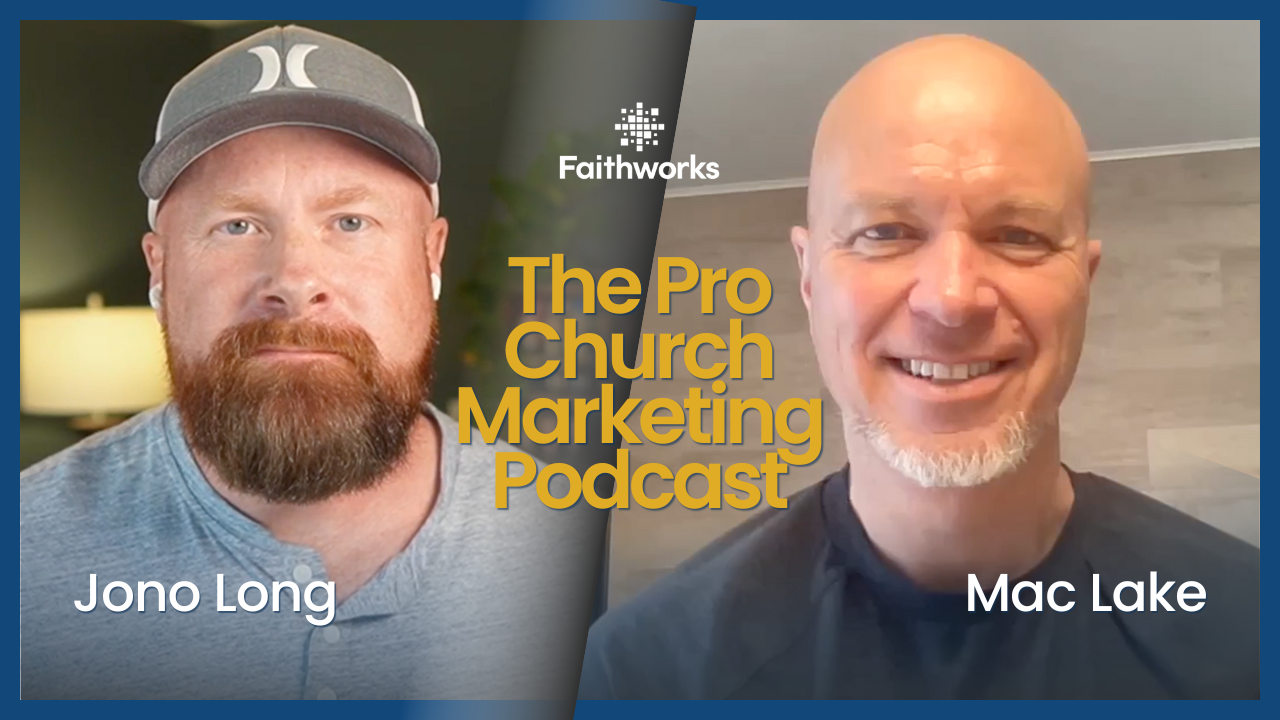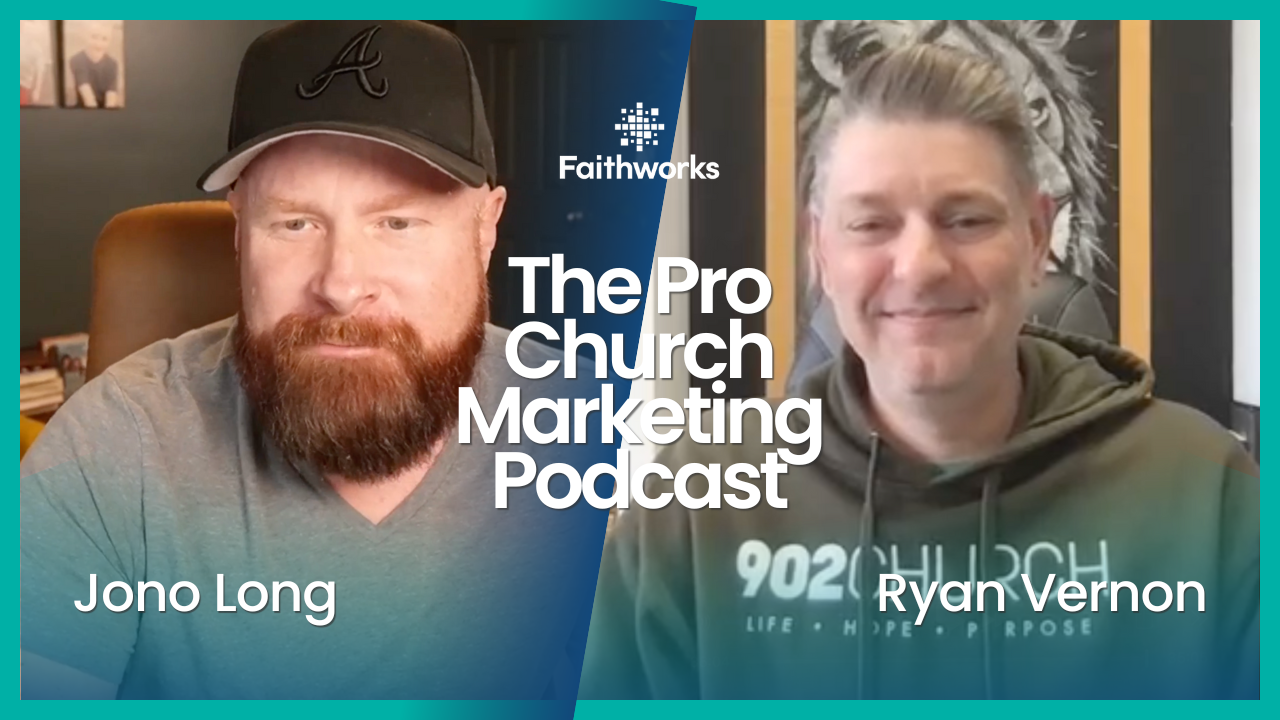How to get $120,000 a year of FREE advertising from Google for your Church or Non-profit
WEBINAR REPLAY
TRANSCRIPT
Let's go ahead and get started. We've got people joining us here in Zoom. We've got people on Facebook and YouTube, so thanks everybody for being here. Really glad you're here. We're going to give you some valuable information.
One of the questions I always get is like, is there going to be like really good stuff? Is this worth my time or is this going to be like a sales pitch? I promise this is not a sales pitch. We really want you to walk away with some valuable information. I think this one is especially valuable because the more pastors, the more Church leaders I talk to and the more directors or executives in nonprofits that I've talked to, a lot of them have no idea that this Google grant even exists.
Maybe you're with us, and you've heard of it. In fact, it would be cool in the chat actually, if you would drop in there whether or not is this the first time that you've heard of the Google grant or you've known about the Google grant. You just have questions; you were scared of it. You didn't really know if you could get it and all that good stuff.
Well, like I said, my name is Jono Long. I own Faithworks Marketing, and we work with Churches and nonprofits to help you get your online presence strong and help you reach more people, help you grow your Church, help you grow your organization, whatever that looks like for you.
We want to help you do that online. I have with me today, who she's not on camera, but you can hear her lovely voice. Ms. Diana Akroyd, who collaborates with us. She manages all of our Google ads for Faithworks Marketing. She has her own digital marketing agency called iDigital, and she's incredible, but she is also the only person I trust to work with on Google ads and all things advertising.
So, thank you so much for being here, Diana.
Anything you want to tell us about yourself?
Not really off the top of my head, honestly, other than I've been involved with Google ads, managing campaigns for folks for, I think about 14 years now. I've seen it evolve over the years into something that was really pretty simple to do into something that's incredibly complicated to do.
I'm just really happy to be here, to help get the word out about the Google grants program, because as we saw, not very many people know about it or people who need to know about it don't know about it.
Yes, absolutely. There's a lot of money being left on the table there and to be able to spend some of Google's money or use some of their resources to advance our organization and our Church.
I think that's pretty incredible. Real quick, just about me, if you're wondering who I am I was a youth pastor about 21 years or so, and a few years ago stepped out of full-time Church staff. I'm always careful to say I didn't step out of ministry because you can still do ministry without getting a paycheck for it.
But I did stop getting a paycheck for ministry. Now I'm just a civilian at my Church, which is kind of cool. I don't have to go to staff meetings anymore. We'll just leave that right there. We get to just volunteer and so it's pretty cool.
We're having a blast and I spend all my time helping Churches and nonprofits get their online presence where it needs to be. Today we are again talking about Google ads. Let's just start here at the most basic level. Let's just start with what Google ads are, generally speaking, before we talk about the grant.
Diana, can you just tell us a little bit, kind of the 30,000-foot view of what Google ads are?
Sure. So, to put it in its simplest form, Google ads is like the yellow pages. You go there to find businesses and that's where they are. So, and it's more complicated form. It's basically a form of digital marketing that operates under a pay per click or also what's referred to as a PPC model.
And that means that you only pay per click for each click on your ad. But more specifically, marketers will target specific keywords that are relevant to you, your business or organization, make bids on those keywords because at its core, it's an auction that's taking place every time you perform a search and then you compete with others who are also bidding on those same keywords for placement on Google search results.
Gotcha. So, in a Church's case, when we're talking about ads, you mentioned keywords there. A phrase like, Church near me, that's a keyword that a Church might want to run an ad that targets that phrase when someone types that into Google. Right?
Right. Yep. So, Churches in Austin, Churches near me, Churches with youth groups, Churches open today.
Any sort of phrase that you can kind of think of that's relevant to your Church or organization.
I was looking in the Google keyword planner and I think in Georgia on average, the phrase Church near me is searched around 31,000 times a month.
I know we have to take that with a grain of salt. I'm not sure if you can tell me how entirely accurate that is, but I was looking at Florida as well. We've got some clients in Florida, we're running some ads for, and in Florida Church near me, at least in the Google tool was saying that phrase was searched about 67,000 times a month on average so far this year, which that sounds pretty huge.
Well, yes. And it's going to depend also on where you're located. So, it's going to depend on if you're rural, or if you are in the suburbs or if you're in a city. So, your searches are going to be higher where you have more people, obviously.
So, there's different kinds of Google ads and there's some that really wouldn't necessarily affect a Church like local search ads. And then there's some that don't really fit into the grant, but just across the board. Can you tell us just a little bit about the different types of Google ads that are options for anybody?
So, search ads of course are most common and are also the types of ads that you're allowed to run with a Google grant. And that's simply when you go in and you type in a phrase in google.com and then you see the results there. There are other ads on their display network that you can also run.
And I always like to advise my grant clients that it's good to run a supplemental campaign with a minimal budget that helps with reach and awareness because the display network basically consists of every website out there. So, there's millions, I mean, trillions of impressions available on the display network versus the search network.
And to kind of explain the difference between search and display. Like I was saying, the search network is like the yellow pages. You go there to look something up. The display network is more like a billboard on the highway and the highway is the internet. So, when you are driving that highway, surfing the internet and you're looking up a recipe for dinner or you're over on CNN or you're on a weather app or you're playing a game on your phone or whatever it might be. That's where you'll see ads that are called image ads or display ads. And you have the ability to reach out to people in specific audiences, people who are interested in certain topics.
There's lots of different targeting methods that you can use on the display network versus search. So, when you have a little bit of a combination of both. Reach and awareness on the display network, but also being there for when people are searching specifically for you in what you offer, you're in both places, and they work in tandem together.
So, someone may see you over on recipes.com and then they'll be like, ugh, you know, a few days later, what was that Church that I saw that ad. They'll go over to Google search. They'll then put in Churches near me looking for you, or maybe they'll go to your site directly. Maybe they remember the website for whatever reason.
Then you'll also capture that search on the search network as well.
So just kind of as a way of illustration here and I used plumber near me because I don't think there's any Churches in my area running any ads, but you get a couple sets of results here. And so just really quick, scrolling down, these are your organic results down here that you don't really pay Google for. A lot of times, they're full of these directories like Yelp and stuff like that. Then these are your local maps, and this is more where Search Engine Optimization comes in. But it's important for Churches to show up there. We did a webinar on that. I think we did that last month, if I'm not mistaken. But then you come up here and this is where the ads show up. As far as in your basic Google search.
Now up here, you've got these Google guaranteed. These are called local service ads. They're mainly for home services, locksmiths, real estate agents, people like that. It's more of a pay per lead service. So, what we're talking about when we say the search network we're talking about this set of results right here, these ones that say 'ad' by it.
So, this is how we're going to show up at the top. Really kind of take a shortcut by giving Google a little bit of cash and they're going to put us at the top. So that's what we're talking about when we're talking about the search network ads.
Right. Am I saying all that right?
Yep. You got it. There's one other place that their ad will serve.
So, I've gone ahead and queued up an example for Churches in Austin, where I live and here's an ad here, which I was kind of surprised to see it. Cause you don't see very many of them, but North Village Church is running an ad. I'm assuming, probably on a grant. So, your Church will have the opportunity to serve right there on top. When someone clicks on this ad, they're then routed to your Google My Business page, where they can find out more information about you, read your reviews, see exactly where you're located. And that's the other place too.
Very cool. I've seen some businesses rank with that, in the maps, but that's the first time I've seen a Church.
And it would show more often on mobile devices typically.
So, it kind of depends on what type of device you've been searching from. But here's another place too. It'll serve in one of the first two positions. When you open up the maps.
Gotcha. So typically, there's just going to be three results in that local pack or that map pack, us SEO guys call it.
I think something interesting to point out there, like the two Churches that are number one and two something they've got going on, they've got, well over 200 Google reviews. Hill Country's got almost 300 and then North Village Church, that's showing up number one, they've got 13 Google reviews.
So, I think that its important just to keep in mind that Google reviews play an important role. And I know some guys feel kind of unpleasant asking for Google reviews for your Church, but that's definitely going to help.
I'm curious, and maybe this is more of an SEO thing, but like I noticed North village Church, the top three, they're showing that they're open right now. Even though they're not having services right now, they're showing that they're open right now. So, I guess they're just kind of going by their office hours, whereas it looks like maybe Grace Point Austin, their open time looks more like about the time you would have a Church service. So, I don't know that that necessarily plays a role, but I think it could be argued that it might not be a bad idea to show your office hours in there instead of showing your organization closed all the time if you want to make Google happy. I don't know, push back on that, Diana? Think it matters?
I don't know that it really matters too much because these ads are going to serve 24/7.
But from a business owner perspective, if you want to be available to answer questions from potential new members of the Church or looking for specific things, maybe put your office hours in there so that they know you're reachable.
Yes. If they've got questions, you know, we're going into summer. A lot of Churches are having vacation Bible school and a parents saw a sign. They were driving down the road but didn't have time to write down the number or scan the QR code or whatever. So yes, they come look you up and then it's saying you're closed, but they wanted to call about some information. And a lot of them were going to just go to your website, but you still got a generation, a lot of people that want a phone call.
And so, I think showing that you're available. Definitely going to help from a conversion standpoint. May not help your ads show more, but definitely going to help take that person who saw your ad from just a viewer of the ad to possibly an actual engaging conversion.
Not a conversion in the sense that all you pastors are thinking like converting but a conversion from they saw the ad and then did something with the ad. That's what, in this world, that's what we would call a conversion. So, make sure to define our terms there.
The other thing I wanted to point out too just real quickly was that when you have an ad and it's showing in the maps, you get a different pin.
So, you'll notice North Village and Wayside have this green box with a white cross while everybody else has a red dot with a white cross. So, it just kind of makes you stand out a little bit more too.
I did not know that. Interesting. You just taught me something.
So, onto the Google grant. So now we know what a Google ad is, we know where they show up, we know what it can do, or a little bit about what it can do. Tell us what is the Google ad grant?
Google ads grant is a program in which qualifying nonprofits have access of up to $10,000 per month in search ads on Google.
And something to keep in mind. I think this is the question I get a lot. I don't know if you've ever gotten this, but
I've gotten them all. Trust me.
I've been asked several times, so does Google just send you a check for 10,000?
Oh, I wish. No. That would make things easier. Wouldn't it?
So, what you do is you have to qualify to receive a grant by being an eligible non-profit. You can't be governmental, hospital, health care, schools, academics. So, this is why it's perfect for Church organizations. Also, you have to have a high-quality website that meets their website policy and be able to meet their program policies.
And that's something that a PPC manager like myself helps you with. Maintaining your account and encouraging it to spend as much of the grant as possible while still staying relevant in the search results. So just to kind of give you an example, this is a campaign. And so, what happens is that when you open up this account, it's not billed, they don't bill you.
But I have to set it up at I think it's $328 a day so that you don't spend more than $10,000 a month. So, no money actually changes hands. It's kind of like a credit.
So, they're not mailing you a check.
You create a Google ad account, and you're going to get that account approved for the grant. We'll talk a little bit more about that in just a second. But then now you've got $10,000. It's an in-kind grant, basically. It's ad credit to spend. I think it's important to put in perspective just how much $10,000 is. We still have some clients, obviously we want to mostly work with Churches and nonprofits, but we still have quite a few clients that are not Churches, not nonprofits.
And we've got a couple of clients that are multimillion dollar a year companies and their Google ad spend budget is, I think our highest paying client is spending maybe $7,500 a month. And they've got like eight locations in the Southeast, and I know what their revenue is, and they could probably spend a little bit more, but my point being even a huge multi-million-dollar company is only spending about $7,000.
And so, most of our clients can really only afford $2,000 or $3,000 a month if that. And so, to get $10,000 a month in free ad spend from Google that's pretty huge. And now spending all $10,000, if people aren't searching for the keywords that you've got set up. If people aren't searching for what you're advertising, you can only spend so much because you pay when someone clicks on the ad.
So, if people aren't searching for what you've got, then you may not be able to spend all of that $10,000. That's where it can come in handy to have some help. So as far as the requirements. Let's say somebody wants to go out and get the grant right now. They've got to go to the Google ads grant page and basically there's a get started button.
The first step there is, yes, apply for Google non-profits. So, I think one of the questions, one of the things that we get asked is, is it difficult to get the grant and can a nonprofit do it themselves? So, I want to say the answer is yes. In fact, most of the clients that we work with, I think you've said this, Diana, most people come to you, and they've already gotten their grant. Right?
Yes. I haven't really taken part a whole lot in actually obtaining the grant, but Google does make it very simple to do. You simply go to google.com/grants/get-started and you click on get started. And they've got you know often asked questions.
You can watch a little video to help understand the application process and then pretty much, once you just submit your application, it's just up to Google to review and approve. I really haven't had any instances in which there was an issue.
I've only seen it not go well one time. But I've seen our pastor's daughter. She was my intern when she was in high school, when I was a youth pastor, and she got a job on staff at a Church, and I sent her a few YouTube videos. She wasn't even out of college yet. And she got the Google grant for her Church. No problem. And then started watching a ton of YouTube videos and figured out how to set up some campaigns.
And of course, we had a couple zoom sessions where I coached her. But she had no problem getting the grant. Part of that first step though is, when you apply, Google's going to use this third-party service. It's called TechSoup, which is kind of a weird name for a business.
But they use TechSoup just to make sure that you're eligible and make sure that you fit the criteria. Basically, they're just making sure that you're a 501c3 nonprofit organization. Now, TechSoup also has some pretty good classes that you can take to learn more about how to get approved and all that stuff.
They've got some pretty good courses in there. I've actually gone through a couple of their courses. So that may be something to look at. The other thing to think about, I want to throw this in for my Baptist friends, because I grew up in the Baptist world. Grew up in served at several Southern Baptist Convention Churches, and a lot of Churches that are Southern Baptist Churches, rather than going through all the paperwork and headache of getting their own 501c3. They are just kind of under the umbrella of, because each state has its own Baptist convention.
So, I know that the Church I attend is just under the state Baptist convention. So, we don't have our own 501c3. We're working on it. But that's a long process because you're dealing with the IRS and all that stuff. So, if you don't have your own Determination Letter from the IRS you can't do this.
So, if you're a Church and you want to go do this, really, the first thing you need to check on is make sure that you've got your own Determination Letter from the IRS and that you've gone through that process. And that you're not just up under the general assembly or the convention or whatever denomination you may be under.
You want to make sure that you've got your own. So, then TechSoup, typically is going to approve you once you can prove that you're a non-profit. And then from there you're going to get a notification: Hey, you're verified. Now you need to activate your grant. And that's where things can either go great and easy and usually does, or that's where it can break down.
We've gotten quite a few grants for our clients, and it's always gone smooth. There's one. It's actually a friend, they're not a client and they are trying to get approved on their own. And they've gotten denied several times. And the tricky thing is, and Diana, you can appreciate this. Google denies activating the grant, but doesn't really tell them why, which is pretty typical Google for you.
So, we were like, let's speed up the website because it seems some of their verbiage, it's all vague, but they did mention the speed of the website. So, we had to speed the website up, but Google is looking for a quality website. Now they'll tell you a little bit about what they consider a quality website, but a lot of it is, it's just vague because this website that keeps getting denied, we've all combed through it, and I can't come up with any reason that it's getting denied.
Yeah, it can be frustrating sometimes. Google makes it really easy to sign up for things and to spend your money. But when things go wrong, they may get really hard. And that's unfortunately, the state of their support right now is, it takes some work to get a straight answer. You know one benefit to having someone like us on your side to handle those sorts of things for you try and make it as easy as possible and deal with the support issues as they come up.
It can definitely be a headache. And for whatever reason, Google, of all the companies in the world to not be able to have most of their employees work from home during COVID. Google was that company that couldn't. Their support was always: Hey, due to COVID you know, we've had to lay off everybody and people are not working from home. And I'm like, are you kidding me? Google? Can't get everybody working from home? So yeah, they were working with a skeleton crew for a long time in support. I think it's getting a little bit better, but it's still not great. Not that it ever was, but there's no Google hotline for you to call when you need help with this stuff is what we're getting at.
All right. So, let's say you've gone through the process. You've got verified. You've successfully activated and now you're building, you've got some ad campaigns. Let's say we're just going to do a simple ad right now that's about getting people to come visit our Church. What does that look like? And then what are some of the things that Google is going to be looking for in your ads?
Because you do have to keep in mind. Google has and will take an ad grant away from an organization. They'll do it. Well, Diana, maybe you want to speak to that, you know better.
I've never had that happen. I think that it would have to be under a circumstance in which it's being managed extremely poorly and not meeting all the Google policies that are required, as far as management goes. So, you have to maintain a specific click through rate. You have to make sure that your keywords meet their policy requirements. For instance, you can't target single word keywords. Your keywords have to have quality scores of 2 or above. There's a lot of technical things that you have to meet which requires you know, a proficient Google ads manager who knows how to manage a campaign, meet those requirements and still get it to spend that.
So, you mentioned click-through rate. Tell us really quick, what a click through rate is.
Sure. So basically, when you are measuring Google ads performance, you're looking at several metrics. One of those is impressions. An impression, an easy way to describe that is it's a set of eyes on your ad.
So, for instance, when I performed a search, Churches in Austin, this is an impression, an ad serving to a search. So, we're trying to get as many impressions as possible, meaning we're trying to get the ads to serve as often as possible.
Then we're also keeping an eye on how many clicks are received, how many people are actually clicking on your ad. So, the click through rate is the clicks divided by the impressions. What percentage of people actually clicked on your ad and for non-profits for grants, Google requires that you have a rather high CTR.
Now on average, Google says a 1% CTR is good, but for grants you're required to maintain and exceed a 5% CTR. So, in this case, we're doing very well. We have 9.38. It's only been live a few days, so it's still ramping up, but we're meeting that as well. And as the keywords are graded on quality scores, we'll start to see those.
And then I'll be able to optimize based on quality scores too. But right now, we're 10 out of 10. So, we're doing well. So yeah, those are the main metrics that we're keeping an eye on.
I have seen some clients who were managing their own ads and they weren't doing everything perfectly. Google seemed to be fairly gracious with them. It does seem like they do give you a little bit of time to ramp that up to that 5%. It was a myth there for a while, a myth that I believed in, I had heard from some people I trusted that if you didn't get to a place where you were spending a vast majority of that $10,000, they would take it from you.
But that's just the myth, right?
Yeah. I have not heard that myth actually. I mean, well, think about it. Why would they take it away because you're not spending? It doesn't benefit Google.
I thought it was dumb, but people would present it and some of these guys I would listen to, they're talking about, yeah, you know, if you're not spending it, they're going to take it away from you. But yeah, upon some further research, we find out that that's not really true.
So, let's say I'm a Church leader and I'm going to get the grant. I'm going to try myself. I'm going to do this, and I've gotten the grant. And now obviously I'm not a Google ads pro, but I could watch some YouTube videos. I can figure some things out and I want to give it a shot. What are some ideas for ads? What are some of the go-to things for a Church? If they were going to create a few ads themselves?
Well, you want to make sure you're targeting your brand name, which is the name of your Church. Also, things like, Churches near me, whatever denomination your Church is, some general keywords for Church services. If you have groups that you want to advertise, Bible studies, donations.
Virtual services are pretty big right now. I was noticing as well, especially, you know, when COVID hit. So, you're targeting a lot of different kinds of keywords. You have to make sure that they're in the right match types. You'll notice some of them are in phrase, have little quotation marks.
That's a phrase match. Then you've got exact match with the brackets, and you also have to make sure that they're all tightly themed. You need to have ad groups that are very keyword specific. So, when I set this one up, all of the Bible study keywords are contained within one ad group. All the branded keywords are contained within one ad group.
The brand ad group that's when we want to use our Church's name. The goal there is just to make sure that if someone's searching specifically for us, that a typo or poor search engine optimization, doesn't get in the way of us showing. Right? Am I right? Why do we want a branded campaign?
Well, the more real estate you have on the page in the Google search results, the better you are. If you're at the top of the page, if you're in the map, and then if you're there organically, that gives users three opportunities to see you and to click on.
So, it's kind of dominating the search engine results there. We were showing up in the maps we're showing up down there in the organic results, but now we're showing up in the ads too.
And so just psychologically, you think that about, if you search, best Mexican food near me, you see them in an ad or, best plumber near me. You see them in an ad, then you see them in the maps, then you see them right below the maps and it's like, dang, well, they're there three times.
And I think also it's capturing more. Every time I do a speech or a talk somewhere, I always ask people how many people always click on the very first result you see, and half the hands will go up. And how many of you never click on the first three or four results that you see in half the hands will go up.
So, you've got different user characteristics or that some people don't trust anything they find on top because they heard somewhere those are ads. No matter how relevant they actually are. And then you've got other people who like me, I will always click on whatever is most relevant at the top of the page, because I don't like to scroll.
So back to the question there, just some ideas for ads for Churches and nonprofits. What about things like, let's say we do have a big event coming up. Let's take vacation Bible school. I know Facebook ads are a little bit nimbler and that we can throw a Facebook ad up a month beforehand and go on there, but would you use the Google grant and create ads for just one-time events?
Or do you think these ads are better used for ongoing things like your Sunday morning service or your men's group or your youth group you know, things that are happening all the time.
It would depend on how well-known the event is because remember, Google search is for people who already know what they're looking for.
If you're trying to promote a spring festival. If it's one that's well-known, then they might go looking for it. But if it's one that's not real well known, then it might be better to advertise that on the display network where you can increase your reach and your awareness.
Because on the display network, we can actually show a picture of the event.
Yeah. And target specific audiences, wherever they are. They don't have to be searching for you, they just have to have a potential interest in what you're doing. And then you don't want to do Google ads for an event a couple of days before the event starts, also. You don't want to say, oh, we want to put up some ads. Because again, in addition to having to know about it already, in order to find you on Google search, it also needs time.
The campaign needs time to ramp up. So, it may not start serving ads. As you can see, when I show you this campaign, that's only been serving for a few days, we're seeing a stair-step of where the machine is learning and it's then going to serve ads more often, the more data it accrues. So, start your campaign for spring, you know, in January, February.
Or let's say your Church does a big marriage conference or a men's conference, something like that. And you know, y'all do that every October. So yeah. You know, six months ahead of time, we can go ahead and start doing some ads and you'd have time to improve the ads.
I think that could possibly work. What about something like let's say a kid's ministry has got, they've got kids camp and they've got a sports camp and they've got this game night; they've got like five events they're going to do, and it's all on their website.
Would it be beneficial to set up an ad group, that's about, you know, fun, free things to do with my kids this summer? I know my wife, Googles that phrase. And so, I'm wondering, are there moms out there, you know, the kids are home for the summer and they're Googling right now, free things to do with my kids.
Yeah. I think that would be great. I mean, you can really think outside the box. The only thing is you have to balance it with relevancy because relevancy is king with Google. They just want to make sure that when users go to their search page, that whatever they're looking for, whatever result they get is absolutely relevant to what they're searching for.
And this is kind of what got the grants program reconstructed a few years ago. I think a lot of grantees were targeting terms that were way outside, what was actually relevant to them in the attempt to raise awareness. And so, Google is like, hold on guys, it's got to be relevant. So, then there are new policies in place that you have to meet that makes it a little harder to spend the money because they require you to be really, really relevant.
So, some of these guys. They may be running an ad for their dog rescue nonprofit, but they were going in there and adding keywords that related to roofing.
Or even just something like dog treats, you know toys for dogs, you know, things that weren't, that were kind of relevant, but just not real relevant.
Gotcha.
There's a fine line.
So, Google's whole mission is to get the most relevant thing in front of the person who is searching. And so, they play by their own rules, and they changed the rules a good bit. We've got to follow those rules, or we'll get slapped on the wrist by Google or even worse perhaps.
Right. Well, they can, the campaign just won't perform, you know. I had a grantee client who was using the grant prior to these, and we were targeting keywords that were like, for instance what is love? Well, they had a blog somewhere that mentioned love. And so, there were just, you know, all kinds of keywords and we had to pause a lot of them because they weren't highly relevant.
They didn't have a high CTR. And you know, we had to conform.
Well, this is my last question. We've kind of operated this way with all the ad campaigns that we run. If we're not measuring them, then in a way we're kind of wasting our time.
It's even more tempting with a Google grant since there's not money coming out of your pocket to just kind of throw out, let's see what happens. If something good happens, we get a lot of clicks, fine. But if we don't, well, we tried, we didn't lose any money because it didn't come out of our pocket.
But really, I would say if you're not going to measure these things and check the effectiveness of it, it's kind of a waste of time. So, I guess my question would be one, do you agree with that? And then two, how do we measure the ads and know that they're working? Especially in the case of a Church or a nonprofit, cause we're not trying to sell roofs here.
We're not trying to get you know plumbing leads. We're trying to get the attention of people who may come to our Church.
From my perspective on a Google grant, you're right, because you're not spending your own money. It's not as important. However, from a management perspective, it is because Google will only allow you to bid up to $2 on your keywords.
However, if you put in place conversion tracking, Then they allow you to use a different bid strategy that may then bump you up over that $2 cost per click limit, which means you can spend more of the grant money. So, it's kind of a domino effect there. So, there's various ways that we can track performance.
Now, tracking performance also makes my job easier because when I'm going through and I'm reviewing these keywords, I'm going to be looking at what's converting and how to determine if that particular keyword phrase is effective or not. Do I need to look at building this out further? Do I need to get rid of it?
So, it plays a kind of a dual purpose in that it's giving the machine, because this is a machine. It's learning. It's AI. It's machine learning. Collecting data, it's learning off of that data. And then I'm able to improve the performance based on that data. But I have to know how to manipulate the machine to do that.
So that's when the conversion tracking comes in. So, we can track calls. We can track form fills; we can track the button clicks. We can track, maybe we have some pages like directions page. That's important. Cause if they're looking up directions and they're most likely going to be going to your Church. Certain things like that.
Again, we have to think outside the box a little bit, but having that data to measure performance is very, very important.
I think, yeah, thinking out of the box is a huge deal. Because Church worlds just different than businesses. One of the things that I heard that a Church is doing. They allow people to pre-register their kids.
So, you know, on a Thursday you decide you're going to go visit this, Church. In fact, my Church does this. You can, pre-register your children for the children's program on Sunday morning. And so, there's just a little website where you can go in and give a little bit of information, let them know what allergies they have and you know, any food restrictions, whatever.
And then you submit, and then when you get there Sunday morning, the badges, the stickers are going to be waiting for you. The security stuff, all the check-in stuff and saves you a little bit of time. But that's also something that we could track, right? That if someone made it from the ad and pre-registered their child for Sunday morning for kids Church then we know that boom, that person saw the ad, went to the page, registered their kid and submitted that form.
And so, we know that that was a result of that ad.
The only time you won't be able to track it is if they go to your site and they don't perform a conversion, they don't fill out a form or they don't make a phone call and then they leave and then they'd go back later. So, cause then you lose the tracking when they leave the site. Because Google will only report direct conversions. And that doesn't mean that there wasn't an assisted conversion that did originate with a click on your ad. It's just that it's reported different.
Yeah, and there's a good chance that a lot of the conversions are going to be those assisted conversions because you know, people, they make it to the website then they go to your Facebook page. They want to see, you know, what you've been doing. They would go to your Instagram, check you out there.
Then maybe go back to Google and check out the Google reviews.
And in between that, they got a phone call, UPS delivery, the dog was barking, the kid was needing something.
Exactly. And so, if they walked on Sunday and you realize they're new and you're greeting them, and you say: Hey, how did you hear about our Church?
There's no telling what they're going to say. There there's a good chance they may say, I think we saw you on Google. But they may have started on Google, and it very well may be that they remembered the last thing they saw about you on the internet, which was your Facebook page. And so, they may say, oh yeah, we saw you on Facebook.
And so, you know, you have to take it with a little bit of a grain of salt.
The customer journey is wide and varied.
Absolutely. Well look, this has been awesome. Any other little tidbits that you want to throw out there before we land this plane?
I cannot think of a thing. We've covered a lot.
I feel like we covered it all. I feel like we did pretty, or you did pretty good. I just kind of ran my mouth a little bit. Look, I really appreciate you being with me. I appreciate everybody who joined us here on Zoom and YouTube and Facebook and wherever else this was. But we really appreciate you being here.
I do want to invite you to join our Facebook group. It's called Pro Church Marketing, and it's just a place where I'm in there throwing out some tips and other guys are in there. We're just helping each other out, encouraging each other. And if you've got questions, let's say you're going to try to get the ad grant on your own, and you're looking for some advice or you get stuck at a spot, that would be a great place to jump in and get some help there.
So, it's just facebook.com/groups/prochurchmarketing. Definitely go join our Facebook group or invite the rest of your Church staff to jump in there. And you can always email me at jono@faithworksmarketing.com, and I'd love to help you out.
And of course, at the end of the day, if you come down to it and you're like, yeah, this all sounds great, but I just don't have time to fool with it. Diana and I would love to talk to you more about how we can help you, and we are here to help you grow. So again, thank you all for being here.
Thanks for joining us, Diana. Thank you. You're awesome. And be watching out for next month's workshop. We'll be sending out emails and we plan to do this every month and teach you as much as we can about online marketing. So, thanks everybody. Have a great rest of your day.

Latest Posts




© 2025 All Rights Reserved | Faithworks Marketing







